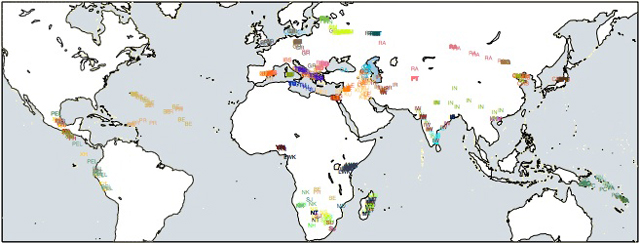For centuries, scientists have sought a biological method for tracing a person's geographic origin. Now, a group of researchers has developed such a genetic ancestry test that can pinpoint the location where a person's ancestors originated more than 1,000 years ago.
The genetic algorithm accurately predicts the country of ancestral origin for about 80 percent of people, and for isolated island populations, it can predict people's island or even village of origin in some cases, researchers report today (April 29) in a study published in the journal Nature Communications.
A person's DNA contains more than simple instructions — it also tells the story of their evolution, migrations, interbreeding and mixing, said study leader Eran Elhaik, a population geneticist at the University of Sheffield in England. [The Best Genealogy Software for Tracing Your Family Tree]
"Only genetic tools can access this vast archive and extract the exact information about our geographic origin," Elhaik told Live Science.
Researchers have been attempting to use genetic data to trace human origins for decades. The best efforts have been able to accurately trace ancestral place of origin within about 435 miles (700 kilometers) in Europe, but not very accurately in other countries.
Genetic GPS
Elhaik and his team created an algorithm that uses genetics to home in on an individual's country of origin, called the Geographic Population Structure, with the fitting acronym GPS. The method first reconstructs ancestral human gene pools around the world. Then, it analyzes an individual's genome and associates each "letter," or base, in the genetic code with one of the global gene pools, creating a kind of genetic fingerprint. Finally, it matches each fingerprint to the fingerprints of populations that have resided in a specific location for a long time.
The researchers used the GPS algorithm to trace the origins of more than 600 people worldwide. The algorithm matched 83 percent of those people to their ancestral country of origin, dating between 1,000 to 3,000 years ago.
For Southeast Asians and tropical Pacific islanders, the algorithm matched 87 percent to the island where their ancestors originated. And for a group of people from the Italian island of Sardinia, the algorithm matched 25 percent to their ancestral village, and the remainder to within 31 miles (50 km) of their villages.
For comparison, the researchers tested the best alternative algorithm, developed by researchers at the University of California, Los Angeles, on their data and found it identified the correct country of ancestral origin for only 2 percent of people.
The genetic test was less accurate for highly mixed populations, such as Bermudans and Puerto Ricans, who have experienced major demographic shifts over the past few hundred years, Elhaik said.
For people of mixed ancestry, whose parents originated in different places, the algorithm predicted the geographic midpoint of both places. In the next version of the algorithm, called GPS2, the researchers aim to predict the country of origin of each parent.
Dr. Harry Ostrer, a professor of pathology, pediatrics and genetics at Albert Einstein College of Medicine, in New York, said the new method was interesting and fairly accurate, although the results need to be replicated in other studies to verify their accuracy.
"There's a significant commercial market for ancestry testing," Ostrer said. "People want to know what their ethnic and geographic origins were."
Source: Live Science
http://www.livescience.com/45215-genetic-ancestry-test-predicts-ancestral-origin.html


